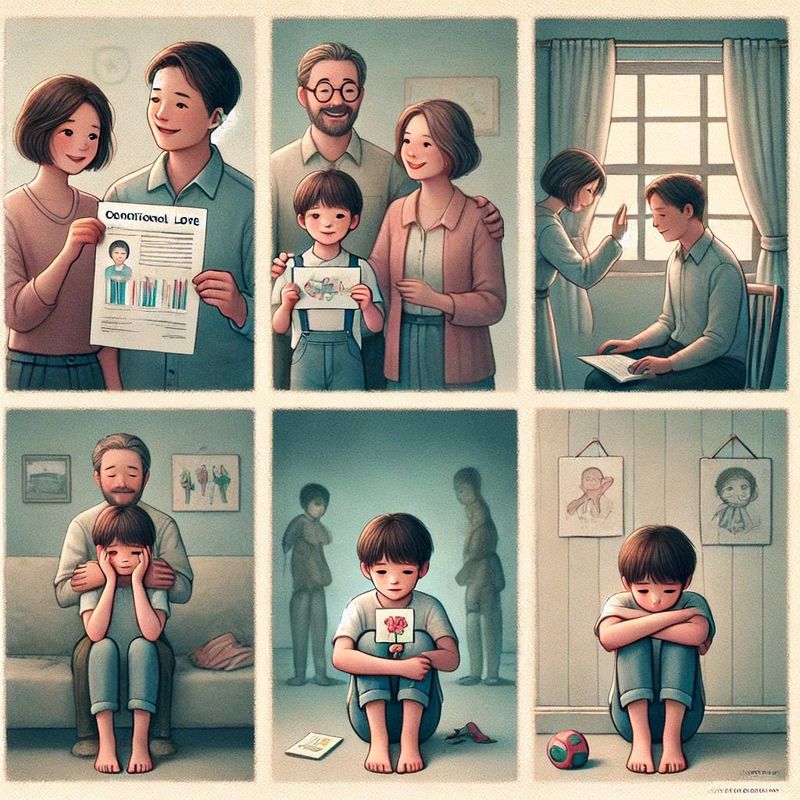18 Signs You Were Raised By A Low-Quality Parent, According To Psychology
Growing up in an environment where parental influence is negative can leave lasting marks on an individual’s emotional and psychological well-being. This article explores 18 tell-tale signs that might suggest you were raised by a low-quality parent.
These signs, grounded in psychological studies, demonstrate how family dynamics and emotional patterns during childhood can shape adult behaviors.
1. Your feelings were dismissed as ‘dramatic’

Have you ever felt like your emotions were belittled? Being labeled as “dramatic” during childhood can stifle emotional growth. This dismissive attitude teaches children that their feelings are invalid, creating adults who struggle to express themselves authentically. The fear of being judged as overreacting may linger, making it challenging to seek support when needed.
In these households, emotional expression might be met with eye rolls or sarcastic remarks. Over time, you learn to suppress genuine reactions, fearing ridicule or punishment. This emotional stunting can lead to difficulties in forming deep connections as adults, as vulnerability feels like a threat rather than a strength.
Understanding the impact of such dismissiveness is crucial in healing and embracing one’s emotional truth.
2. You were made responsible for their emotions

Imagine being a child and feeling responsible for your parent’s happiness or anger. This burden can distort a child’s sense of self, making them overly attuned to others’ needs. Such responsibility places undue stress on young shoulders, fostering anxiety and a chronic sense of inadequacy.
In these dynamics, children learn to prioritize their parent’s emotional state over their own, potentially leading to codependent relationships in adulthood. They might struggle to establish their independence, fearing they’ll let someone down.
Breaking free from this pattern requires recognizing that everyone’s emotional well-being is their responsibility. Therapy and self-reflection can aid in reclaiming personal emotional space and developing healthier boundaries.
3. Criticism came more often than praise

If criticism was your constant companion growing up, you might find it hard to celebrate personal achievements. Constant fault-finding can erode confidence, leaving only self-doubt. Constructive criticism is essential, but when it’s all you hear, it becomes damaging.
Children crave affirmation, and without it, they might grow into adults who are perfectionists or, conversely, who give up easily. The fear of criticism can paralyze creativity and initiative, resulting in missed opportunities.
Recognizing your worth and learning to accept praise is vital. Surrounding yourself with supportive individuals who celebrate your successes can help retrain your brain to value your accomplishments, small and big alike.
4. You feared speaking up to avoid conflict

In households where silence is golden, fear often reigns. Children raised in such environments learn quickly that speaking up can lead to conflict, judgment, or punishment. This fear can manifest as anxiety or a reluctance to advocate for oneself later in life.
Silencing your voice to maintain peace might keep the household calm, but it stifles personal growth. It teaches children to avoid confrontation at all costs, even when it’s necessary to stand up for themselves.
Overcoming this fear involves practicing assertiveness in safe environments, gradually building the confidence to express one’s thoughts without fear of retribution. Developing skills in communication can open doors to healthier relationships and personal empowerment.
5. Love felt conditional on your achievements

When love feels like a prize to be won, rather than a given, it skews a child’s sense of security. Such conditions teach children that their worth is tied to performance, fostering a relentless pursuit of validation through achievement.
This mindset can persist into adulthood, leading to burnout and a constant chase for external approval. It can create a cycle where failure feels catastrophic, as it seems to strip away the possibility of love and acceptance.
Understanding that love is unconditional is a healing process. Building self-esteem and recognizing intrinsic worth can help break the cycle, allowing individuals to pursue passions and goals without fear of losing love.
6. You were compared to siblings or peers constantly

Comparison is the thief of joy, yet many parents engage in this detrimental habit. Being constantly compared to siblings or peers can foster a sense of inadequacy and competition rather than community and support.
This behavior can lead to strained sibling relationships and a lifelong struggle with self-esteem. The pressure to measure up to an ideal can cause anxiety and depression as children internalize a belief that they are never enough.
Breaking free from this cycle involves celebrating one’s unique strengths and achievements. Embracing individuality and fostering an internal sense of worth can lead to healthier relationships with oneself and others.
7. Their approval felt impossible to earn

Chasing after elusive approval can leave one feeling perpetually unworthy. If parental approval seemed unattainable, it likely instilled a sense of never being good enough, no matter the accomplishments.
This dynamic can create adults who overwork or who give up entirely, seeing effort as futile. The constant striving for validation can lead to stress, anxiety, and a reluctance to take risks for fear of failure.
Recognizing that validation from others isn’t the sole measure of worth is a crucial step to healing. Building self-compassion and acknowledging personal achievements, regardless of external approval, can nurture a healthier self-esteem.
8. Boundaries were never respected

Boundary violations are a common issue in low-quality parenting. When parents ignore a child’s need for privacy or autonomy, it teaches them that their personal space and feelings are unimportant.
This disrespect can lead to adults who either struggle to set boundaries or become overly defensive and guarded. The inability to assert one’s limits without guilt is a significant hurdle in forming healthy relationships.
Learning to establish and maintain boundaries is essential for personal growth. It involves understanding one’s rights to privacy and autonomy, and practicing assertive communication to uphold these rights. Therapy can be a valuable tool in rebuilding these foundational skills.
9. Your successes were minimized or ignored

When successes are brushed aside, it sends a message that achievements are insignificant. This dismissive attitude can undermine a child’s confidence and motivation, leading to a lack of self-appreciation.
Children need acknowledgment to build a sense of competence and self-worth. Without it, they may grow up feeling that nothing they do matters, fostering a mindset of defeat and resignation.
To counteract this, individuals can practice self-validation and actively celebrate their own successes. Surrounding oneself with people who are genuinely supportive and appreciative can also help reinforce a positive self-image.
10. You often felt like the parent in the relationship

Role reversal can burden a child with responsibilities that aren’t theirs to bear. When children feel like they must parent their parents, it disrupts the natural family hierarchy and places undue stress on them.
This dynamic can lead to adults who are overly responsible, neglecting their own needs in favor of others’. They may struggle with relationships where they feel compelled to “fix” or caretake excessively.
Recognizing and relinquishing this role is vital for personal well-being. It involves setting boundaries and acknowledging that caregiving should be reciprocal, not one-sided. Embracing one’s role as a child, and not a caretaker, can restore balance and foster healthier relationships.
11. They used guilt to control your choices

Guilt can be a powerful tool for manipulation. Parents who wield guilt to influence their child’s decisions create an environment of emotional coercion. This tactic can instill a sense of obligation and fear of disappointing others.
Such emotional manipulation can lead to adults who prioritize others’ expectations over their own desires, fearing the repercussions of asserting independence. This can hinder personal growth and happiness.
Breaking free from guilt-driven decision-making involves identifying manipulative behaviors and asserting one’s autonomy. Building confidence in one’s choices and learning to prioritize personal needs over imposed obligations is crucial for emotional freedom.
12. Apologies from them were rare or absent

A lack of apologies from parents can teach children that accountability is unnecessary. When mistakes are never acknowledged, it sets a precedent that can damage trust and respect in relationships.
This absence of accountability can lead to adults who either avoid apologies, fearing vulnerability, or who expect perfection from themselves and others. It creates an unhealthy dynamic where mistakes are perceived as failures rather than learning opportunities.
Learning to give and accept apologies is essential for relationship repair and growth. It involves acknowledging mistakes, taking responsibility, and fostering forgiveness, both towards oneself and others.
13. Emotional support was non-existent

In homes where emotional support is lacking, children might feel isolated and invisible. The absence of nurturing responses to emotional needs can leave lasting scars, impacting self-esteem and emotional resilience.
Without support, children can grow into adults who find it hard to trust others or seek help. They might become emotionally withdrawn, fearing rejection or further disappointment.
Cultivating emotional support as an adult involves seeking out relationships where empathy and understanding are present. Therapy can also provide a safe space for exploring and healing from these early emotional wounds, fostering a more supportive inner and outer world.
14. You were taught to suppress your needs

When a child’s needs are consistently ignored or dismissed, they’re taught to suppress them to avoid causing inconvenience. This can lead to an adulthood of self-neglect and unfulfilled desires.
Such conditioning can create individuals who prioritize others’ needs over their own, fearing that expressing desires is selfish or burdensome. This suppression can manifest as a lack of self-awareness and dissatisfaction in life.
Recognizing and voicing personal needs is crucial for a balanced life. It involves understanding that one’s needs are valid and deserve attention. Building this awareness can lead to more fulfilling relationships and personal contentment.
15. They invalidated your version of events

When your reality is constantly questioned or dismissed, it creates a foundation of self-doubt. This invalidation can lead to confusion about personal experiences and a distrust of one’s perceptions.
Growing up in such an environment can result in adults who second-guess their memories and feelings, fearing they are overreacting or mistaken. It undermines confidence and fosters anxiety about decision-making.
Rebuilding trust in one’s perspective involves acknowledging that personal experiences are valid. Therapy can help in affirming and processing these experiences, leading to stronger self-trust and clearer judgment.
16. They discouraged independence to keep control

Independence is a key part of growing up, but some parents stifle it to maintain control. This discouragement can hinder personal growth and the ability to make decisions confidently.
Children raised in overly controlling environments may struggle to assert themselves or explore new opportunities. They might fear failure or disappointing their parents, leading to missed experiences and underdeveloped life skills.
Fostering independence involves taking small steps toward autonomy, like making decisions and learning from mistakes. Encouraging self-reliance and resilience can help break free from controlling dynamics, enabling a more empowered adulthood.
17. Their moods dictated the whole household’s energy

When a parent’s mood sets the tone for the entire household, it creates an unstable environment. Children learn to walk on eggshells, adapting themselves to avoid triggering negative reactions.
This atmosphere can lead to anxiety and hypersensitivity in adulthood, as individuals become attuned to detecting and managing others’ emotions rather than their own. It fosters an environment where personal feelings are secondary to maintaining peace.
Learning to separate one’s emotional state from others’ moods is vital for personal stability. Therapy and mindfulness practices can aid in developing emotional autonomy, fostering a healthier sense of self.
18. You still struggle to trust or open up to others

Trust is foundational to healthy relationships, yet it’s often compromised in toxic familial settings. If trust was broken frequently during childhood, it can carry into adulthood as a hesitance to open up.
Adults who experienced betrayal or inconsistency might struggle with intimacy, fearing vulnerability will lead to hurt. This can result in isolation or superficial relationships, lacking genuine connection.
Building trust involves taking small risks in safe environments and embracing vulnerability as a strength rather than a weakness. Developing supportive relationships where trust is earned and honored can help rebuild this essential foundation for meaningful connections.







